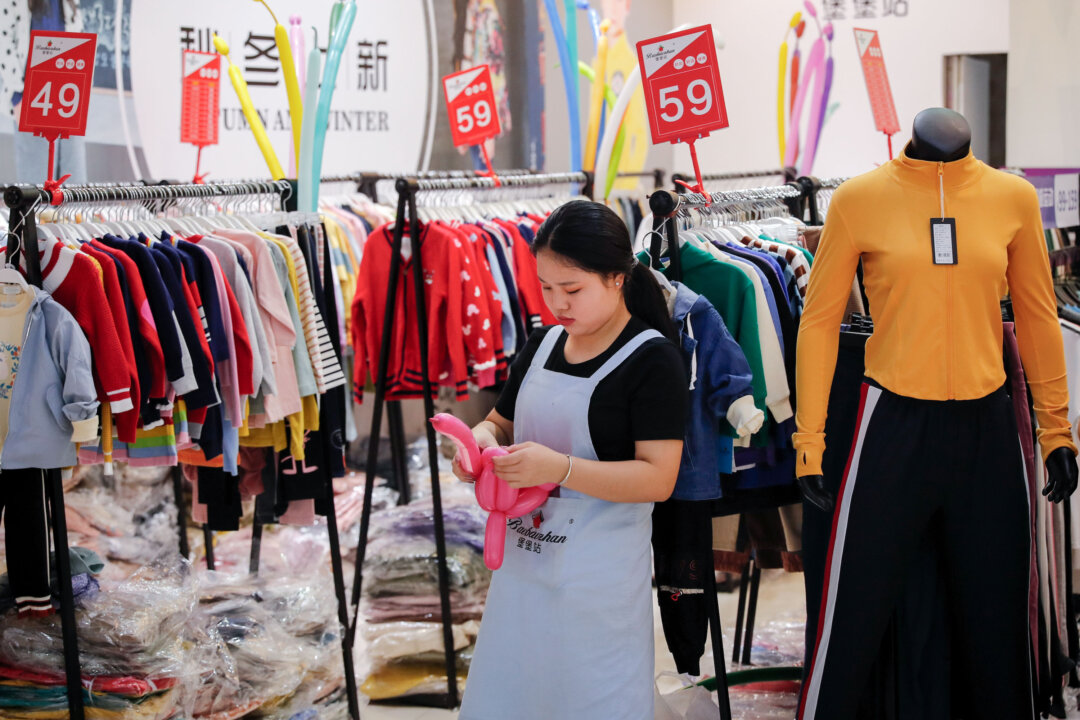China’s economic figures show weak consumer spending, highlighting vulnerabilities in its economy.
China’s latest economic data indicate that looming U.S. tariffs are already impacting its economy as domestic consumption remains weak, economists have told The Epoch Times.
According to data published on Dec. 16 by the National Bureau of Statistics (NBS) of China, in November, the country’s industrial output grew by 5.4 percent year-on-year. It’s slightly faster than the rate in October (5.3 percent) and expectations for a 5.3 percent increase in a Reuters poll.
However, retail sales of consumer goods in November only grew by 3 percent, compared with a 4.8 percent year-on-year increase in October, and a 4.6 percent expansion that analysts had predicted.
Taiwanese financial analyst Edward Huang suggested the growth of industrial output may not last.
Besides seasonal factors, U.S. President-elect Donald Trump’s plan to increase tariffs on Chinese goods may have contributed to November’s figure, he told The Epoch Times.
Trump has threatened to increase goods from China by at least 10 percent on top of the 60 percent increase he promised during his campaign.
According to analysts, it’s one of the factors that has prompted U.S. importers to move up their shipments.
In a statement, John Piatek, a vice president at procurement and supply-chain software provider GEP, said, “In November, U.S. manufacturers, particularly in the consumer goods sector, increased their safety stocks to help blunt any immediate tariff increases.”
U.S. imports of containerized goods notched a 12.8 percent year-over-year increase in November, according to trade data supplier Descartes Systems Group.
“Trump’s tariffs have already taken effect before they are implemented,” Huang said, adding that he expects incoming tariff hikes will have a detrimental impact on China’s economy.
“Most factories may have to withdraw from China. Although China hopes to devalue the yuan to offset the impact of the tariff increase, I don’t think that will completely cancel the impact,” he said.
U.S.-based economist Davy Wong also pointed to incoming U.S. tariffs as a reason for the increase in China’s industrial output in November, saying the number “doesn’t mean much.”
Among all industrial output in November, new energy vehicles grew the fastest, by 51.1 percent year-on-year. The output between January and November grew by 37.5 percent.
“That may just be overcapacity. They may not be able to sell all those products,” Wong told The Epoch Times.
“We are seeing weak demand for electric vehicles in China. Increasingly, electric car makers are suddenly going bust, so the data on industrial output no longer reflects the economic situation,” he said.
Earlier this month, Jiyue, a joint venture between tech giant Baidu and Geely Auto, was disbanded. It came after a raft of new energy car makers withdrew from the market or went bankrupt in recent years.
Weak Consumption
Compared to industrial output, Wong said the figure on retail sales more accurately reflects China’s real economic environment.
The 3-percent growth in retail sales in November was the slowest in three months despite the fact that the month contains the so-called Double 11 Day, which refers to Nov. 11, known as Single’s Day in China.
A breakdown of the figures shows a steep drop in cosmetics sales in November, by 26.4 percent.

While part of the drop may be explained by the longer “Double 11” promotion that began earlier in October this year, the total sale of cosmetics between January and November also declined by 1.3 percent.
Jewelry sales between January and November fell by 3.3 percent on the same period last year. Sales of building materials, cars, and stationeries declined in the same period.
Meanwhile, the amount of investment in real estate between January and November fell by 10.4 percent from the same period last year.
The increase in fixed asset investment slowed to 3.3 percent in the first 11 months of this year. From January to October, the rate of increase was 3.4 percent year on year.
Wong said the data on consumer goods and investment in real estate showed that “despite various so-called policies to stimulate consumption and to promote investment, overall consumer confidence remains weak, and consumers have little money.”
This comes after over two decades of deliberation on transitioning from the current growth model focused on fixed-asset investment and exports to a consumption-driven one.
Stimulus Policies
In recent months, the Chinese communist regime has put out a series of stimulus policies to boost domestic consumption and investment, including cutting interest rates, issuing more government bonds, and subsidizing consumer goods upgrades and trade-in deals.
Wong said the policies announced so far have shown little material benefits.
“In particular, we can see consumers’ sense of uncertainty in the housing market,” he said. “The overall pressure on healthcare, education, pension, and other aspects is still huge, and the unemployment rate continues to worsen.
“Therefore, although consumption is said to have increased by 3 percent year-on-year, some seasonal factors or other factors may have contributed to the increase. The real overall consumption may have been in significant decline,” he said.
Yi Ru, Luo Ya, and Reuters contributed to this report.

